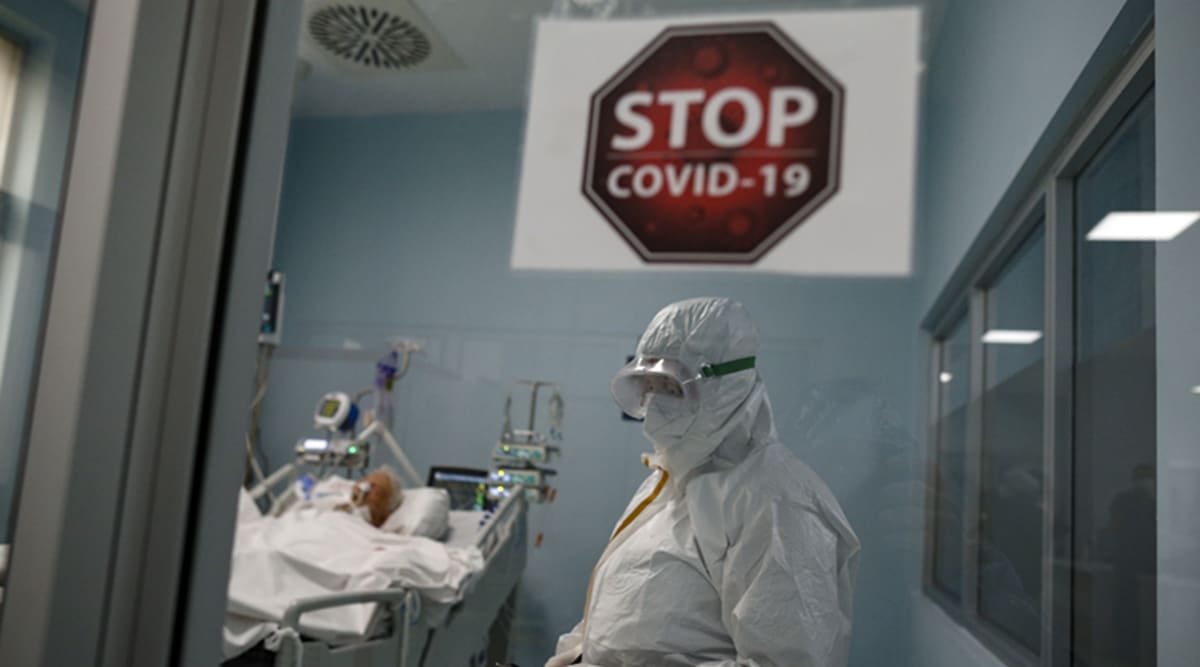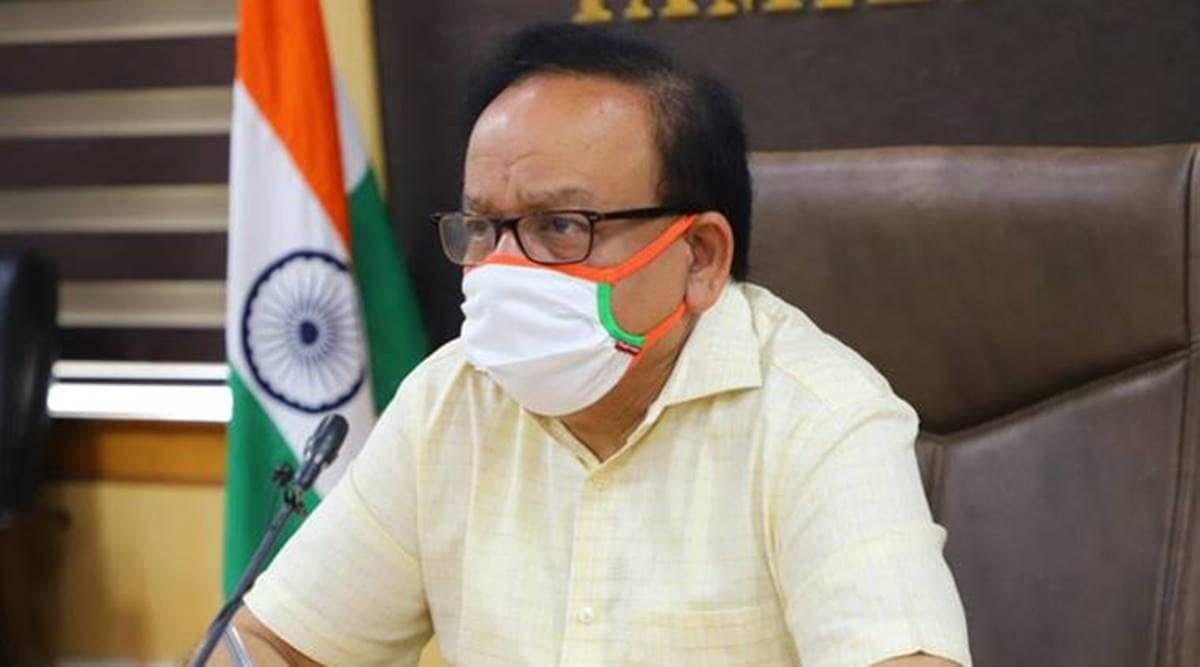
Updated: December 21, 2020 8:46:11 pm
 In the intensive care unit of Dr. Ilhan Varank Hospital, Istanbul, Turkey. (AP)
In the intensive care unit of Dr. Ilhan Varank Hospital, Istanbul, Turkey. (AP)
As Covid-19 vaccines begin rolling out in several countries, a new strain of the coronavirus discovered in Britain has caused panic globally. The strain, which is said to be up to 70 percent more transmissible than the original, has already forced several countries to close their borders or ban travel with the UK and has sown fears of further economic disruption.
Here’s everything you need to know about this new strain of coronavirus
What is this new strain of coronavirus?
The new variant, which UK scientists have dubbed “VUI – 202012/01” includes a genetic mutation in the “spike” protein that the SARS-CoV-2 coronavirus uses to infect human cells. According to scientists, these changes, in theory, can lead to a more rapid spread of Covid-19 between people.
When and where was it discovered?
According to a BBC report, the variant was first detected in September in the UK. In November, about a quarter of the cases in London were related to this new variant. The virus carrying this mutation has so far caused 1,100 new infections in 60 local authority areas, according to reports citing UK Health Secretary Matt Hancock.
Where has it been reported and is it most serious?
Apart from the UK, Italy is another such country where the new strain of the virus has been found. France also spoke about the possibility of the new strain of coronavirus in the country. Australia also reported on Monday the mutant strain of coronavirus in two returnees from the UK.
 Travelers look at information panels at King’s Cross station, as EU countries impose a travel ban from the UK following the outbreak of the coronavirus disease (COVID-19), in London, UK, on December 21, 2020 (Reuters)
Travelers look at information panels at King’s Cross station, as EU countries impose a travel ban from the UK following the outbreak of the coronavirus disease (COVID-19), in London, UK, on December 21, 2020 (Reuters)
However, there is no evidence as of yet to suggest that the new variant will cause serious Covid-19 infections. According to the scientists, genetic mutations or changes arise naturally in all viruses, including SARS-CoV-2, as they replicate and circulate among humans. However, an increase in transmission would be enough to cause problems for hospitals where more people will come for treatment.
How has the world responded?
As of Monday, the UK was cut off from the rest of Europe after several nations decided to close borders out of fear of the new strain of coronavirus. France became the first to close its border with the United Kingdom for 48 hours.
 A police officer directs traffic at the entrance to the closed ferry terminal in Dover, England, on Monday, December 21, 2020, after the port of Dover was closed and access to the Eurotunnel terminal suspended following the announcement of the French government. (AP)
A police officer directs traffic at the entrance to the closed ferry terminal in Dover, England, on Monday, December 21, 2020, after the port of Dover was closed and access to the Eurotunnel terminal suspended following the announcement of the French government. (AP)
In addition to France, Germany, Poland, Sweden, Denmark, Finland, Austria, Bulgaria, Romania, Malta, Croatia, Lithuania, Latvia, Estonia, Italy, the Netherlands, India, Belgium, Greece, Russia, Hong Kong, Israel, Argentina, Chile, Colombia, Ecuador and El Salvador have banned flights to and from the UK. Saudi Arabia, in particular, has suspended all international flights for fear of the new strain of coronavirus.
What did the Indian government say?
India has also joined with more than two dozen countries to ban inbound travel from the UK. The government also said that as an abundant precautionary measure, passengers arriving from the UK on all transit flights, those who have taken off, or flights arriving in India before 11:59 pm on December 22, they would be subject to mandatory RT-PCR. test upon arrival at the respective airports.
 Union Health Minister, Dr. Harsh Vardhan. (Archive)
Union Health Minister, Dr. Harsh Vardhan. (Archive)
The Maharashtra government has said that all passengers coming from Europe and the Middle East would have to undergo a mandatory 15-day institutional quarantine, while travelers from other international destinations will have to undergo a home quarantine.
Meanwhile, the Union Health Minister Dr. Harsh Vardhan said on Monday that the government was on alert about the new strain of coronavirus and urged people not to panic. Director General of the Council for Scientific and Industrial Research, Shekhar Mande, said: “We have not yet found this (particular mutation) in isolates from India.”
Will vaccines work against this new strain of virus?
So far yes. On questions about whether the mutation can affect an individual’s response to the vaccine, the scientists said this was unlikely. The virus has undergone several mutations since it first infected humans, which scientists say is neither unexpected nor cause for panic.
 A drop falls from a syringe after a healthcare worker is injected with the Pfizer-BioNTech COVID-19 vaccine. (AP)
A drop falls from a syringe after a healthcare worker is injected with the Pfizer-BioNTech COVID-19 vaccine. (AP)
Dr. Gagandeep Kang, Professor at Christian Medical College, Vellore, said that several coronavirus vaccines are designed to create antibodies that target the spike protein. But vaccines target multiple regions in the beak, whereas a mutation refers to a single point change. So if there’s a mutation, it doesn’t mean the vaccines don’t work, Dr. Kang said.
“There are likely to be differences between things like antibodies, but that doesn’t necessarily mean that vaccines are ineffective. The vaccines will be just as effective despite the mutation. So there is no reason to panic, ”the PTI quoted the director general of the Council for Scientific and Industrial Research, Shekhar Mande.
(Contributions from agencies)
.